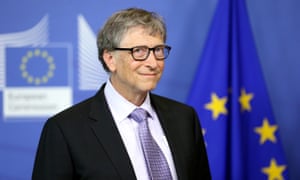What billionaires want: the secret influence of America’s 100 richest
A new study reveals how the wealthy engage in ‘stealth politics’: quietly advancing unpopular, inequality-exacerbating, highly conservative policies

If we judge US billionaires by their most prominent fellows, they may seem to be a rather attractive bunch: ideologically diverse (perhaps even tending center-left), frank in speaking out about their political views, and generous in philanthropic giving for the common good – not to mention useful for the goods and jobs they have helped produce.
The very top titans – Warren Buffett, Jeff Bezos, Bill Gates – have all taken left-of-center stands on various issues, and Buffett and Gates are paragons of philanthropy. The former New York mayor Michael Bloomberg is known for his advocacy of gun control, gay rights, and environmental protection. George Soros (protector of human rights around the world) and Tom Steyer(focused on young people and environmental issues) have been major donors to the Democrats. In recent years, investigative journalists have also brought to public attention Charles and David Koch, mega-donors to ultra-conservative causes. But given the great prominence of several left-of-center billionaires, this may merely seem to right the balance, filling out a picture of a sort of Madisonian pluralism among billionaires.
Unfortunately, this picture is misleading. Our new, systematic study of the 100 wealthiest Americans indicates that Buffett, Gates, Bloomberg et al are not at all typical. Most of the wealthiest US billionaires – who are much less visible and less reported on – more closely resemble Charles Koch. They are extremely conservative on economic issues. Obsessed with cutting taxes, especially estate taxes – which apply only to the wealthiest Americans. Opposed to government regulation of the environment or big banks. Unenthusiastic about government programs to help with jobs, incomes, healthcare, or retirement pensions – programs supported by large majorities of Americans. Tempted to cut deficits and shrink government by cutting or privatizing guaranteed social security benefits.
How can this be so? If it is true, why aren’t voters aware and angry about it?
The answer is simple: billionaires who favor unpopular, ultraconservative economic policies, and work actively to advance them (that is, most politically active billionaires) stay almost entirely silent about those issues in public. This is a deliberate choice. Billionaires have plenty of media access, but most of them choose not to say anything at all about the policy issues of the day. They deliberately pursue a strategy of what we call “stealth politics”.
We have come to this conclusion based on an exhaustive, web-based study of everything that the 100 wealthiest US billionaires have said or done, over a 10-year period, concerning several major issues of public policy. For each billionaire we used several dozen carefully selected keywords to find all publicly available information about their specific talk or actions related to any aspect of social security, any type of taxation, or anything related to abortion, same-sex marriage, or immigration policy.
Consider social security, the largest and most popular domestic program in the United States. Social security has been the subject of spirited debates for decades. Is it going “bankrupt”? (No.) Should its benefits be expanded, to keep all retirees’ incomes well above the poverty line? Or – as advocated by the billionaire Pete Peterson (co-founder of the Blackstone private equity firm) and wealthy allies who fear that high government spending and deficits would erode bond values – should guaranteed benefits be cut, perhaps through less generous cost-of-living adjustments, or by ending guaranteed benefits entirely and leaving retirees with private accounts subject to stock-market fluctuations?
Most of the wealthiest US billionaires have made substantial financial contributions – amounting to hundreds of thousands of reported dollars annually, in addition to any undisclosed “dark money” contributions – to conservative Republican candidates and officials who favor the very unpopular step of cutting rather than expanding social security benefits. Yet, over the 10-year period we have studied, 97% of the wealthiest billionaires have said nothing at all about social security policy. Nothing about benefit levels, cost-of-living adjustments, or privatization. (Also nothing about the popular idea of shoring up social security finances by removing the low “cap” on income subject to payroll taxes and making the wealthy pay more.) How can voters know that most billionaires are working to cut their social security benefits?
In fact, people who pay the closest attention to the media may actually be the most misled, because most of the very few billionaires who have spoken out about social security – like Buffett and Soros – have supported a generous social security system in television interviews and newspaper op-eds.
Or consider the estate tax. Our study ferreted out quiet activity by 12 of the wealthiest billionaires – including the Kochs and (perhaps unsurprisingly) several wealthy inheritors of the Walton and Mars fortunes – aimed specifically at cutting or abolishing the estate tax. They gave money to policy-oriented organizations seeking to abolish the tax, or founded such organizations, and served on their boards. Not a single billionaire took such activity to support the estate tax.
Yet here, too, citizens could be badly misled by what a handful of famous billionaires said in public. Among those who spoke out, more than half actually supported the estate tax. These include our usual suspects – Gates, Buffett, and Bloomberg – who are very atypical of US billionaires as a whole.
Our findings help illuminate how the political network assembled by the Koch brothers could have become so powerful. The Kochs have had a fertile field of less-well-known conservative billionaires to cultivate for hundreds of millions of dollars in in secret, unreported contributions. The Kochs’ entrepreneurship and organizational skills, together with stealthy contributions by these little-known billionaires, have produced a political juggernaut.
Both as individuals and as contributors to Koch-type consortia, most US billionaires have given large amounts money – and many have engaged in intense activity – to advance unpopular, inequality-exacerbating, highly conservative economic policies. But they have done so very quietly, saying little or nothing in public about what they are doing or why. They have avoided political accountability. We believe that this sort of stealth politics is harmful to democracy.
Since you’re here …
… we have a small favour to ask. More people are reading The Guardian’s independent, investigative journalism than ever but advertising revenues across the media are falling fast. And unlike many news organisations, we haven’t put up a paywall – we want to keep our reporting as open as we can. So you can see why we need to ask for your help.
The Guardian is editorially independent, meaning we set our own agenda. Our journalism is free from commercial bias and not influenced by billionaire owners, politicians or shareholders. No one edits our editor. No one steers our opinion. This is important because it enables us to give a voice to the voiceless, challenge the powerful and hold them to account. It’s what makes us different to so many others in the media, at a time when factual, honest reporting is critical.



No comments:
Post a Comment